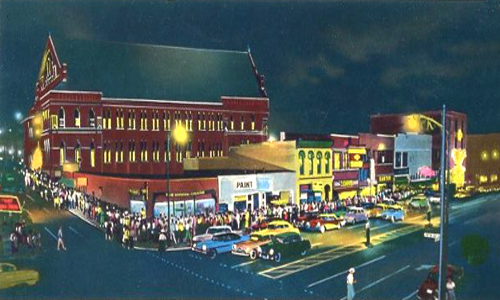On Saturday nights in the early 1950s, I laid on the living room floor near our tube radio console listening to the Grand Ole Opry over WSM radio from the historic Ryman Auditorium in Nashville. My main attractions were the Opry humorists. Let me cite a few of my favorites.

Minnie Pearl (Sarah Cannon) from “Grinder’s Switch,” always wore a big smile, plaintive country dress and flower-laced straw hat that still had the $1.98 price tag dangling from it. Her opening line was “How-w-w-w dee-e-e-e, I'm jes' so proud to be here.” An oft-told joke was that when she died, she wanted all women pallbearers. She reasoned that if the old men wouldn’t take her out while she was alive, she didn’t want them to take her out when she passed away.
Rod Brasfield, a comedian who resided from “Hohenwald,” frequently sparred with Minnie on the Ryman stage. The country bumpkin’s talent was poking good-natured fun at the simplicity of country life – “Minnie, we raise tomatoes on our farm. We eat what we can and what we can’t eat, we can.” The audience loved him.
The Duke of Paducah (aka Whitey Ford, real name Benjamin Francis Ford) told jokes on the Opry – “My brother went through reform school on a scholarship.” Ford always concluded his performance by saying, “I'm goin' back to the wagon, boys, these shoes are killin' me.”
Opp, Alabama native, Lew Childre, better known by country music fans as “Doctor Lew,” was another crowd pleaser. He performed a one-man vaudeville-style comedy act of hillbilly singing, tap dancing and cruising his slide guitar. His unique rendition of “Hog Calling Blues” epitomized the crooner’s versatile witty humor.
Lonzo (Johnny Sullivan) and Oscar (Rollin Sullivan) and their sidekick, “Cousin Jody” (Clell Summey), wore outlandish costumes. The latter sang and played a lap steel guitar that he referred to as a “biscuit board.” One of their songs, “Why Should I Cry Over You,” began as a dawdling tearjerker and ended in a rollicking finale.
June Carter, daughter of Mother Maybelle Carter of the Original Carter Family, loved to clown with numerous onstage performers. On one classic routine, Gordon Terry played “Johnson’s Old Gray Mule” on his fiddle, sang and mimicked the stubborn animal by jerking his mouth with his hand. June’s role was to distract him throughout the number by pulling his pants legs above his boots.
Grandpa Jones (Louis Marshall Jones) acquired the name “Grandpa” in 1937 at age 24 from singer/songwriter great, Bradley Kinkaid. He received the moniker because of his grouchiness on early morning radio. His forte was singing and comedy – “My uncle was so bald that he had to draw a chalk mark on his forehead to tell how far up to wash his face.” “Eight More Miles to Louisville” became a frequently requested song of the entertainer.
David “Stringbean” Akeman was a tall lanky clawhammer banjo picker (down-picking style of playing) and singer. To accentuate his height, “Strang” wore an exaggerated shirt that positioned his belt below his waist and resulted in the crotch of his blue jeans being about level with his knees. His tag line was “Hang on chillun” just before launching into a lively hillbilly ditty such as “Hillbilly Fever’s Goin’ ‘Round.”
The Opry began in 1925 as the WSM Barn Dance; two years later, it was renamed the Grand Ole Opry. George D. Hay, known as the “Solemn Old Judge,” ended each show by blowing his train whistle and saying, “Right now it’s time for the tall pines to pine, the pawpaws to pause, and the bumble-bees to bumble all around. The grasshopper hops and the eavesdropper drops, while gently the ole cow slips away.” This was Grand Ole Opry at its best.

Comments are closed.